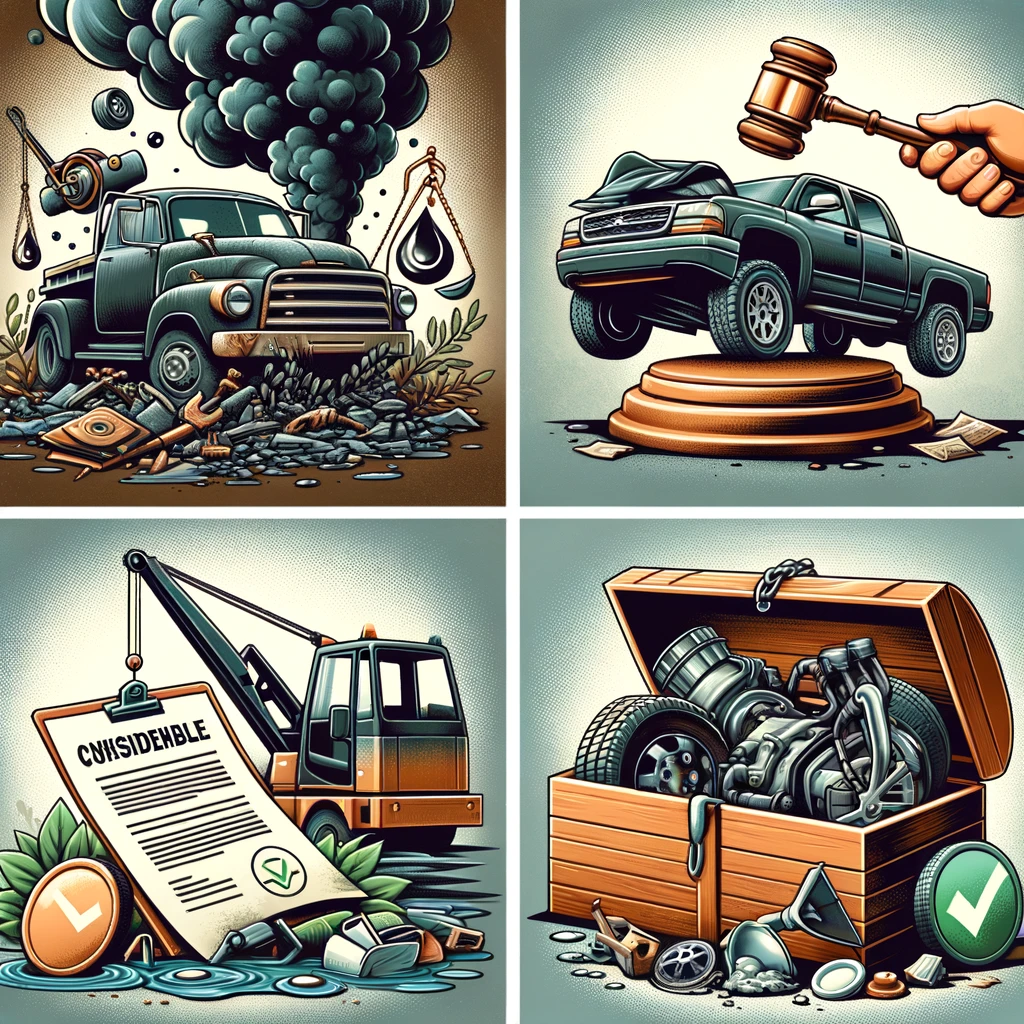Cash for Junk Cars: A Comprehensive Guide
CASH FOR CARS &
FREE TOWING
Introduction to Cash For Junk Cars Solutions
The concept of turning a junk car into cash might seem straightforward, but it encompasses a range of solutions and opportunities for car owners. Cash for junk cars, often seen as nothing more than an eyesore or a burden, can actually represent a source of value. Whether it's through direct sale, parts salvage, recycling, or donation, there are multiple avenues to explore.

Understanding the Value of Junk Cars
Junk cars hold value in various forms. While the whole vehicle might not be operational, parts of it can still be in working order and in demand. Additionally, the raw materials, such as metal, can be recycled and reused, contributing to the circular economy. Understanding this hidden value is the first step in transforming your junk car from a liability into an asset.
Benefits of Selling Junk Cars for Cash
Selling a junk car for cash not only clears up space on your property but also provides an immediate financial return. It's an eco-friendly solution that ensures hazardous materials are disposed of properly while recyclable parts are put back into use. This process supports environmental sustainability and offers a hassle-free way to deal with an otherwise unusable vehicle.
Responsible Junk Car Disposal
Disposing of a junk car responsibly is crucial for environmental protection and legal compliance. The process involves more than just getting rid of an unwanted vehicle; it requires consideration of its impact on the environment and adherence to local regulations.
Environmental Impact of Junk Cars
Junk cars, if left unattended, can become environmental hazards. Fluids such as oil, coolant, and gasoline can leak and contaminate soil and water sources. Moreover, rusting metal and non-biodegradable components contribute to pollution. Responsible disposal means ensuring that these cars are recycled in a way that minimizes their environmental footprint, through processes that safely remove and recycle or dispose of hazardous materials.

Legal Considerations for Junk Car Disposal
Legal requirements for junk car disposal vary by location but generally include ensuring the car is disposed of at a licensed facility, transferring ownership properly, and handling hazardous materials correctly. Documentation is key; you'll likely need to provide the title and may need to complete specific forms or notices depending on your jurisdiction. Familiarizing yourself with these legalities can prevent potential fines and legal issues, ensuring a smooth and compliant disposal process.
Exploring Junk Car Towing Services
When it's time to say goodbye to your junk car, towing it to its final destination is often the first step. Choosing the right service and preparing your car for towing are essential for a hassle-free experience.
Choosing a Reliable Towing Company
Selecting a reputable towing company involves researching local services, reading reviews, and comparing quotes. Look for companies with experience in handling junk cars, as they'll be familiar with the necessary procedures and documentation. Ensuring the company is licensed and insured is also crucial for your peace of mind and the safety of your vehicle during transportation.
Preparing for Junk Car Towing
Preparing your junk car for towing involves removing personal belongings, ensuring all paperwork is in order, and if possible, making the car accessible for the tow truck. Inform the towing service of any specific conditions or challenges related to your car or its location, as this can affect the type of tow truck needed and the overall cost.

Unlocking Value from Junk Car Parts
Even in a non-operational state, a junk car can house valuable parts that can be sold separately, often yielding a higher total return than selling the car as a whole.
Identifying Valuable Junk Car Parts
Commonly sought-after parts include the engine, transmission, catalytic converter, wheels, and electronics. Condition, demand, and rarity determine a part's value. Inspecting these parts and assessing their condition can help you decide whether to sell them individually or as part of the car.
Selling Junk Car Parts Online and Offline
Once you've identified valuable parts, you can sell them through various channels. Online marketplaces, forums dedicated to car enthusiasts, and local auto parts stores are good places to start. Providing detailed descriptions and photos can increase your chances of a sale. Offline, you might consider swap meets, salvage yards, or placing ads in local classifieds.
Junk Car Donation Programs
Understanding Tax Benefits of Car Donations

When you donate a car to a qualified charitable organization, you may be eligible for a tax deduction. The amount you can deduct depends on how the charity uses the vehicle. If the charity sells the car, the deduction is usually limited to the sale price, even if it's below the market value. However, if the organization uses the car for its programs, you might be able to deduct the vehicle's fair market value. It's important to obtain a receipt from the charity and keep records of the donation for tax purposes. Consulting with a tax professional can provide guidance specific to your situation and help you maximize the benefits of your donation.
Choosing a Reputable Donation Program
Selecting a reputable car donation program is crucial to ensure your donation has the intended impact. Research charities to confirm they are registered 501(c)(3) non-profit organizations, which makes your donation tax-deductible. Look for organizations that use a significant portion of their donations to support their charitable causes directly, rather than those that spend a large percentage on administrative or fundraising expenses. Reviews and ratings from organizations like Charity Navigator or the Better Business Bureau can provide insights into the charity's reputation and effectiveness. Finally, clarify with the charity how they plan to use the car and ensure they provide proper documentation for your donation.
Junk Car Valuation Insights
Understanding the value of your junk car is essential to ensure you get the best possible return, whether you're selling, scrapping, or donating it.
Factors Affecting Junk Car Value
Several factors can influence the value of a junk car. The make, model, and year of the vehicle often play a significant role, as some models have higher demand for parts or metal. The condition of the car and its components, especially valuable parts like the engine and catalytic converter, can also affect its worth. Local scrap metal prices are another important factor, as the bulk of the value in a junk car often lies in its recyclable metal content. Lastly, the location of the vehicle can influence its value, with prices varying based on local demand for parts and metal, as well as the cost of towing and transportation.
Estimating Your Junk Car's Worth
To get a ballpark figure for your junk car's value, start by researching the current scrap metal prices in your area, as this will give you an idea of the minimum value based on the car's weight. Online tools and databases can help you estimate the value of salvageable parts. For a more accurate assessment, consider getting quotes from multiple local junkyards or salvage yards, as they can provide prices based on their current inventory and demand. Remember, these estimates can vary widely, so getting multiple quotes can help you understand the range of potential values for your vehicle.
Comparing Junk Car Buyer Offers
Once you have an idea of your junk car's value, comparing offers from different buyers can help you get the best deal.
Evaluating Junk Car Buyer Reputations
Before accepting an offer, it's important to research the buyer's reputation. Look for reviews and testimonials from previous sellers to gauge their reliability and customer service. Check if the buyer is licensed and insured, which is a good indicator of their professionalism. Be wary of buyers who refuse to provide a clear quote or who attempt to charge hidden fees. A reputable buyer will offer a straightforward, no-obligation quote and will stick to their quoted price without last-minute changes.
Negotiating the Best Offer
Even in the junk car market, there's room for negotiation. If you have offers from multiple buyers, use these as leverage to negotiate a better price. Be honest about the condition of your car and any valuable parts it may contain, but don't be afraid to highlight its positive aspects. If a buyer is particularly interested in your car or a specific part of it, they may be willing to increase their offer to secure the deal. Remember, the goal is to find a balance between a fair price for you and a profitable deal for the buyer.
Junk Car Recycling Incentives
The recycling of junk cars offers environmental benefits and, in many cases, financial incentives for car owners. Understanding the available programs and initiatives can enhance the value you get from your junk car.
Government Recycling Programs
Many governments offer recycling programs to encourage the responsible disposal of junk cars, aiming to reduce environmental impact and promote the recycling industry. These programs might offer direct financial incentives, such as rebates or vouchers, for turning in your old vehicle for recycling. Some programs are designed to take older, less fuel-efficient vehicles off the road, improving overall air quality by reducing emissions. To take advantage of these programs, check with local environmental agencies or automotive departments for available schemes. Eligibility criteria can vary, so it’s important to understand the requirements, such as the age and condition of the vehicle or necessary documentation, to participate in these programs.
Industry Recycling Initiatives
In addition to government programs, many private companies and industry groups run initiatives aimed at promoting the recycling of vehicles. These can include partnerships with recycling centers and scrapyards offering competitive rates for junk cars or components. Some manufacturers may also run trade-in programs, where you can receive a discount on a new vehicle when you recycle your old one through their scheme. These industry initiatives not only contribute to environmental sustainability but also offer a way for you to get value from your junk car. Researching these options and reaching out to local dealerships or scrapyards can uncover opportunities to benefit from such initiatives.
Streamlining Junk Car Removal
Efficiently removing a junk car from your property requires some preparation and knowledge of available services that can ease the process.
Preparing for Junk Car Pickup
Before the scheduled pickup of your junk car, there are a few steps you should take to ensure a smooth process. Firstly, remove all personal belongings from the vehicle. Check the trunk, glove compartment, and under the seats for any items you may have left behind. If you have an E-ZPass or other toll device, remove it to prevent unwanted charges. It's also advisable to use up or siphon the remaining fuel from the car, as this can reduce the weight and potentially increase the scrap value. Ensure that the car is accessible for the tow truck, with a clear path that allows for easy removal. Lastly, have your documentation ready, including the title and any required forms, to transfer ownership legally and efficiently.
Convenient Junk Car Removal Services
Choosing a convenient junk car removal service can greatly reduce the hassle associated with disposing of an old vehicle. Many scrapyards and junk car buyers offer free towing services as part of the deal, which is especially beneficial if your car is no longer operable. When contacting services, ask about their towing policies, including any potential fees, the expected timeline for pickup, and what documentation they require. Some services may also offer online scheduling for pickups, making it easier to arrange the removal at a time that suits you. Consider services that emphasize environmental responsibility, ensuring that your car will be recycled in an eco-friendly manner.
Using Junk Car Cash for Loan Repayment
The cash you receive from your junk car can be put to good use, such as paying off outstanding loans or debts. Planning how to allocate these funds can help improve your financial situation.
Understanding Loan Payoff Procedures
If you're considering using the cash from your junk car to pay off a loan, it's important to understand the payoff procedures for your specific loan type. Contact your lender to request a payoff quote, which will provide the total amount needed to completely pay off the loan balance as of a certain date. This quote should include any interest accrued and any prepayment penalties that might apply. Ensure that you understand the method of payment accepted by your lender and any details they require for processing the payment, such as account numbers or reference codes.
Budgeting Junk Car Cash for Loan Repayment
Once you have your payoff quote, compare it to the amount you expect to receive from selling your junk car. If there's a surplus, decide how best to use the extra funds—perhaps paying down another debt or adding it to your savings. If the amount from your junk car doesn't cover the entire loan balance, plan how to cover the difference. This might involve reallocating funds from your budget or exploring other sources of income. By carefully budgeting the cash from your junk car, you can make a significant impact on your financial health, reducing debt and potentially saving on interest in the long run.